

Real or fake? Take our fake news quiz to find out. 12/2/16: Fake news: an insidious trend that's fast becoming a global problem. Germany The German political mainstream is getting increasingly nervous about the effect that the rise of fake news might have on federal elections next autumn.
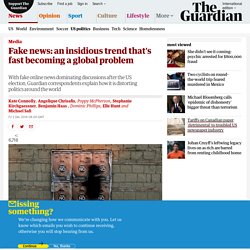
Fake news and Russian interference – either by influencing fake news sites, or by hacking or misinformation – are viewed as a serious threat to the democratic process, particularly since the US presidential elections. From rumours that Merkel was in the east German secret police, the Stasi, to others suggesting she is Adolf Hitler’s daughter, Germans are also proving themselves susceptible to false information. The most blatant example of fake news to hit Germany so far occurred earlier this year over reports that a 13-year-old girl of Russian origin, known as Lisa F, had been raped in Berlin by refugees from the Middle East.
12/7/16: Pope Francis compares fake news consumption to eating faeces. Pope Francis has lambasted media organisations that focus on scandals and smears and promote fake news as a means of discrediting people in public life.
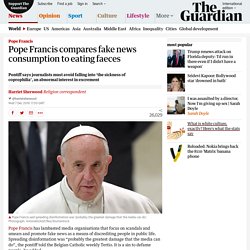
Spreading disinformation was “probably the greatest damage that the media can do”, the pontiff told the Belgian Catholic weekly Tertio. It is a sin to defame people, he added. Using striking terminology, Francis said journalists and the media must avoid falling into “coprophilia” – an abnormal interest in excrement. Those reading or watching such stories risked behaving like coprophagics, people who eat faeces, he added. The pope excused himself for using terminology that some might find repellent. He also spoke of the danger of using the media to slander political rivals. 1/26/18: 'Fake news': Trump dismisses report he ordered Mueller's firing. Media Bias/Fact Check - Learn the Bias of News Media. Untitled.
List of fake news websites– Wikipedia. This is a list of fake news sites.
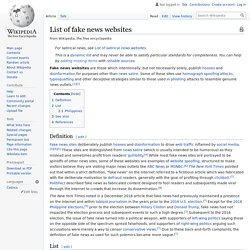
These sites intentionally, but not necessarily solely, publish hoaxes and disinformation for purposes other than news satire. Some of these sites use homograph spoofing attacks, typosquatting and other deceptive strategies similar to those used in phishing attacks to resemble genuine news outlets.[1][2] Definition. Truth, truthiness, triangulation: A news literacy toolkit for a “post-truth” world. We were guaranteed a free press, We were not guaranteed a neutral or a true press.
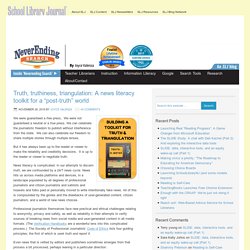
We can celebrate the journalistic freedom to publish without interference from the state. We can also celebrate our freedom to share multiple stories through multiple lenses. Why Facts Don't Convince People (and what you can do about it) 2017 commonsense newsandamericaskids. The #Election2016 Micro-Propaganda Machine – Jonathan Albright – Medium. 😱Real Sources / Fake News After finding evidence that much of the “fake” and hyper-biased news traffic during 🇺🇸#Election2016 was arriving through direct hyperlinks, search engines, and “old school” sharing tactics such as email newsletters, RSS, and instant messaging, I thought I would do a small “big data” project. I wrote this piece because I feel the argument about Facebook’s role in influencing the outcome of the U.S. election doesn’t address the real problem: the sources of the fake/misleading/hyper-biased information. Sure, Google’s ad network and Facebook’s News Feed/“Related Stories” algorithms amplify the emotional spread of misinformation, and social media naturally turn up the volume of political outrage.
At the same time, I think journalists, researchers and data geeks should first look into the factors that are actually 1) producing the content and 2) driving the online traffic. ⚗Welcome to the Micro-Propaganda Machine There’s a vast network of dubious “news” sites. Week 10: Credibility/Authority (*=Key reading) Librarians take up arms against fake news. Librarians are stepping into the breach to help students become smarter evaluators of the information that floods into their lives.
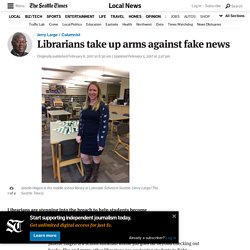
That’s increasingly necessary in an era in which fake news is a constant. Janelle Hagen is a school librarian whose job goes far beyond checking out books. Facing a Divided Nation, ALA Offers Free Training for Libraries. The ALA Public Programs Office and the National Coalition for Dialogue & Deliberation (NCDD) invite library professionals to attend a free learning series to explore various dialogue facilitation approaches and position themselves to foster conversation and lead change in their communities.
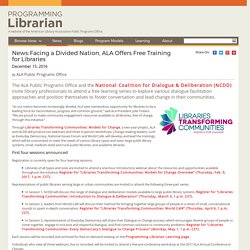
“As our nation becomes increasingly divided, ALA sees tremendous opportunity for libraries to be a leading force for reconciliation, progress and common ground,” said ALA President Julie Todaro. “We are proud to make community engagement resources available to all libraries, free of charge, through this initiative.” Fake News: A Library Resource Round-Up. Don't Get Faked Out by the News. Fake news. Post-truth and information literacy. CC0, Public Domain So there’s this phrase being bandied about: “post-truth.”
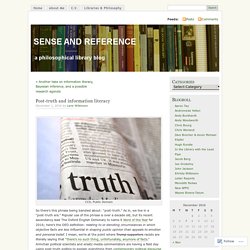
As in, we live in a “post-truth era.” Popular use of the phrase is over a decade old, but its recent ascendancy lead The Oxford English Dictionary to name it Word of the Year for 2016; here’s the OED definition: relating to or denoting circumstances in which objective facts are less influential in shaping public opinion than appeals to emotion and personal belief. I mean, we’re at the point where Trump supporters racists are literally saying that “there’s no such thing, unfortunately, anymore of facts.” Fake News - Evaluating Information - Library Guides at University of Washington Libraries. Search and the Information Landscape (530) U of IL at Urbana-Champaign. UnSpun: Finding Facts in a World of Disinformation by Kathleen Hall Jamieson. Google, democracy and the truth about internet search. Field Guide to Lies: Critical Thinking in the Information Age by Daniel J. Levitin.
Misinformation, disinformation, fake news. The more outrageous, the better: How clickbait ads make money for fake news sites. Robert Shooltz knows that fake news can lead to real money.
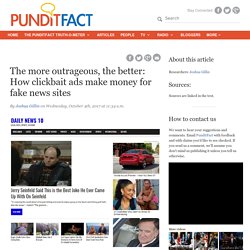
He runs RealNewsRightNow.com, a website that parodies real news outlets by running absurd posts written to read like factual articles. Working online in his off hours, he uses the site to generate advertising revenue. In an average month, he said, his side hustle can net him about $1,000 a month. How do we become better citizens of information?
Much has been written in the last few weeks about how we consume and share news, links and information around and beyond the recent elections.
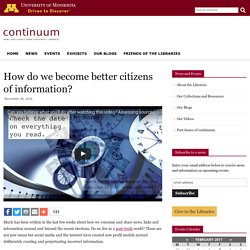
Do we live in a post-truth world? These are not new issues but social media and the internet have created new profit models around deliberately creating and perpetuating incorrect information. 1) Say No to Clickbait and check the domain name Is it a .com? .org? Is it true? Try these fact-checking websites and resources. The Library offers various venues in which patrons can contribute content that is accessible to the public.
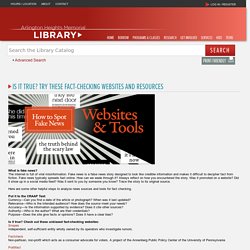
These include, but are not limited to, blogs, reviews, forums, and social tagging on the Library’s website and catalog. Any instance in which a patron posts written or recorded content to any of the Library’s venues that are accessible to the public is considered “patron-generated content” and is subject to this policy. By contributing patron-generated content, patrons grant the Library an irrevocable, royalty-free, worldwide, perpetual right and license to use, copy, modify, display, archive, distribute, reproduce and create derivative works based upon that content.
By submitting patron-generated content, patrons warrant they are the sole authors or that they have obtained all necessary permission associated with copyrights and trademarks to submit such content. Patrons are liable for the opinions expressed and the accuracy of the information contained in the content they submit. 10 Hilarious Hoax Sites to Test Website Evaluation – TeachBytes.
In this day and age, where anyone with access to the internet can create a website, it is critical that we as educators teach our students how to evaluate web content. There are some great resources available for educating students on this matter, such as Kathy Schrock’s Five W’s of Website Evaluation or the University of Southern Maine’s Checklist for Evaluating Websites. Along with checklists and articles, you will also find wonderfully funny hoax websites, aimed at testing readers on their ability to evaluate websites. These hoax sites are a great way to bring humor and hands-on evaluation into your classroom, and test your students’ web resource evaluation IQ! Check out these 11 example hoax sites for use in your own classrooms: Of all of these, my favorite is always the Dihydrogen Monoxide website, which aims to ban dihydrogen monoxide and talks in detail about its dangers.
Post-Truth: Fake News and a New Era of Information Literacy. Truth, Lies and Quibblers: Media Literacy for a New Era. Don't Fall for Fake News. Your library offers workshops and resources to build media literacy. Before fake news and alternative facts there was … The Quibbler and The Daily Prophet. Yes, I am talking about the wizarding world of journalism. Bear with me. For those who skipped the Harry Potter series, The Quibbler was Rowling’s storyline about a tabloid complete with sensational headlines, paparazzi and misleading (even fake) stories. Imagine if Harry Potter readers graduated to Book 7 having gained media literacy skills from the stories. Lest we blame J.K. What is Fake News? - "Fake" News - Library Guides at Penn State University.